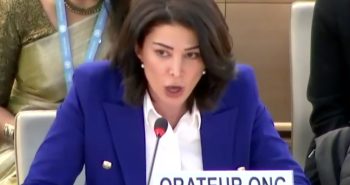Following is a legal analysis of the Pillay Commission of Inquiry’s 2025 report to the UN General Assembly.
By Dina Rovner, Legal Advisor at UN Watch
The Pillay Commission, established in May 2021 under Resolution S-30/1, was designed to isolate Israel internationally, increase sanctions, and build criminal cases against Israeli officials. True to that mission, its latest report accuses Israel of “genocide,” institutional “discrimination” (a euphemism for apartheid), and other grave crimes. It urges states to impose sweeping boycotts and sanctions and even names specific Israeli officials as targets for prosecution in international courts.
The report centers on housing policy in Gaza, the West Bank, and within Israel’s sovereign territory. Its factual analysis and legal conclusions are entirely one-sided, omitting critical context and assigning sole blame to Israel for Palestinian suffering. It ignores Palestinian rejectionism, terrorism, and ongoing warfare — erasing the reality of decades of Palestinian violence and incitement.
While demanding that Israel “recognize and ensure the Palestinian people’s right to self-determination,” the Commission simultaneously denies the Jewish people that same right, demonizing Jewish settlement even within sovereign Israeli territory. Given the Commissioners’ well-documented record of anti-Israel activism and their repeated dismissal of antisemitism, such bias is predictable. But it underscores why this report has no legitimacy, no legal authority, and deserves to be categorically rejected.
As with its previous publications, the Pillay Commission’s latest report is deeply flawed. Key deficiencies are outlined below. The false genocide allegation, already thoroughly refuted, is not addressed here.
1. Bias Evident From Outset
The Commission’s bias is evident from the outset. In its opening paragraph, it declares that from the beginning it viewed October 7th as a “watershed moment” — not for revealing Palestinian rejectionism and commitment to jihadi terrorism, but for portraying Israel as seeking to “solidify and expand the occupation” (Para. 1). In doing so, the Commission perversely transformed the October 7th mass atrocity against Israel into a “watershed moment” to demonize the Jewish state. With this preconceived narrative, the Commission proceeds to manipulate facts to support its foregone conclusion that Israel has “deepened the occupation” since October 7th.
2. Ignores Hamas and Terrorism
The Commission entirely ignores Hamas. The word “Hamas” appears only once in the report (Para. 23), and even then, merely in reference to a quote attributed to Israeli Minister of National Security Itamar Ben Gvir. The Commission itself makes no substantive reference to Hamas, nor does it hold the terrorist organization accountable for any violations, particularly its systematic exploitation of civilian infrastructure in Gaza for military purposes — the primary cause of the extensive damage to civilian property discussed in the report.
Likewise, the report completely ignores the issue of Palestinian terrorism targeting Jews and Israelis. The words “terrorism,” “terror,” and “terrorist” each appear only once, and only when quoted from Israeli officials.
3. Ignores Israeli Hostages
The Commission’s indifference to Israeli suffering is equally apparent in its treatment of the hostages. Apart from a token reference buried in a recommendation to the Palestinian government calling to “immediately release all hostages” (Para. 88), the report entirely ignores the plight of the Israelis — cruelly starved, chained, and tortured by Hamas for two years and deliberately deprived of their most basic human needs.
The Commission makes no mention of their rights to humane treatment, sanitary conditions, or visits by the International Committee of the Red Cross. Moreover, despite testimony from released hostages confirming they were held in civilian homes, hospitals, UN shelters, and designated humanitarian zones — acts that endangered Palestinian civilians and violated international law — the report refuses to address these violations. In omitting these facts, the Commission shields Hamas from accountability and distorts the causes of civilian suffering and destruction in Gaza.
4. Ignores Hamas Tunnels
The report mentions Hamas’s vast tunnel network only once (Para. 16) — not to hold Hamas accountable for diverting millions of dollars in international aid to build terror infrastructure instead of civilian infrastructure, nor for constructing an estimated 350-mile network of tunnels beneath Gaza that endangered all civilian structures above. Instead, the Commission refers to the tunnels solely to criticize Israel for citing them as a justification for establishing security corridors and buffer zones in Gaza. Once again, the Commission absolves Hamas of responsibility while condemning Israel for its legitimate security measures.
5. Erases the War
One of the Commission’s central claims is that after October 7th, Israel “systematically destroyed civilian objects across Gaza and repeatedly forcibly transferred the population” (Para. 13). This framing suggests that Israel invaded and devastated Gaza without provocation.
It erases the Hamas atrocities of October 7th — the massacre of Israeli families and the abduction of some 250 hostages — and ignores the broader war context, including Hamas’s deliberate strategy of embedding its fighters, weapons, and command centers within civilian infrastructure to maximize casualties, property damage, and international outrage.
The Commission later notes that property destruction increased significantly between October 2023 and February 2024 (Para. 20), which coincided with one of the most intense phases of combat between the Israeli army and Hamas. This context demonstrates that the destruction was an unfortunate consequence of urban warfare, not evidence of a genocidal Israeli policy as the Commission claims. By blaming Israel alone for the devastation in Gaza while omitting this essential context, the Commission amplifies Hamas propaganda and effectively serves as an advocate for the terrorist organization.
6. Circular Logic: Citing Itself as “Evidence”
The Commission attempts to lend legal legitimacy to its claims by citing the July 19, 2024 ICJ Advisory Opinion on the effects of Israeli policy on “the exercise by the Palestinian people of their right to self-determination” (Para 5). Yet in doing so, it is effectively citing itself.
The 2024 Advisory Opinion relied heavily on the Commission’s own September 2022 report to the UN General Assembly (A/77/328), which concluded — without considering a range of perspectives or authorities — that Israeli policy violated the Palestinian right to self-determination. That report relied almost exclusively on partisan, pro-Palestinian NGOs and recommended that the General Assembly request an ICJ Advisory Opinion on “Israel’s refusal to respect the right of the Palestinian people to self-determination,” effectively prejudging Israel.
The resulting General Assembly Resolution (A/RES/77/247) echoed this presumption, asking “what are the legal consequences arising from the ongoing violation by Israel of the right of the Palestinian people to self-determination.” The ICJ’s Advisory Opinion then cited extensively to the Commission’s 2022 report. By invoking the ICJ’s conclusions, the Commission here relies on its own unsourced and partisan assertions as supposed legal authority — creating a circular reference rather than providing independent validation. For more on this see Timeline: How the Pillay Commission Instigated the ICJ Assault on Israel.
7. Erases Palestinian Agency
The report deliberately frames Israel’s housing policies through the Palestinian victim narrative, referring to the 1948 war as the Nakba (Arabic for “catastrophe”) (Section II, Background). In doing so, the Commission infantilizes Palestinians, strips them of agency, and absolves them of responsibility for their own fate.
The report presents a selective, ahistorical account claiming that 700,000 Palestinians were “forced to leave their homes,” while ignoring critical context: Arab states rejected the 1947 UN Partition Plan, launched a war of annihilation against the nascent Jewish state, encouraged Palestinians to flee, and ethnically cleansed areas that came under their control of Jews — including the Jewish Quarter of the Old City of Jerusalem and the entire West Bank, home to Judaism’s holiest sites. This selective framing shields Palestinians from accountability while demonizing Israel.
8. Rewrites History to Vilify Israel
Citing no sources, the report claims that the Arabs who remained in Israel after the 1948 war were “forced to concentrate principally in two large geographical areas, the Negev and Galilee,” implying that Israel forcibly relocated them to these regions (Para. 7). In reality, Arabs were already concentrated in these areas and remained there naturally following the war.
9. Falsely Claims Israel Occupies Gaza
While the Commission acknowledges that Israel withdrew from Gaza in 2005, it falsely asserts that Israel has continued to occupy the territory by virtue of its control over “the airspace, water and territorial borders of Gaza, as well as civilian infrastructure, including water and electricity, and key governmental functions” (Para. 17). In reality, although Israel has maintained a lawful naval blockade since 2007 — after Hamas violently seized control of the territory — it has had no physical presence in Gaza and no authority over its internal governance after the 2005 disengagement.
As a matter of international law, occupation requires effective control over the territory, which Israel clearly does not exercise. Indeed, Hamas’s ability to launch thousands of rockets into Israel, construct a vast underground terror network, and orchestrate the October 7th massacre from within Gaza demonstrates that Israel does not control the territory’s internal affairs.
10. Unsupported and Speculative Findings
The Commission’s conclusions rest on conjecture, not evidence. The Commission claims it “could not find reasonable military justification for the consistent and extensive expansion of the two corridors” (Para. 19). Yet it concedes “creating security zones” and “establishing military bases” can serve legitimate military purposes (Para. 72). The report cites no military experts, provides no independent analysis, and relies on unverified information. It also has no access to IDF operational data, internal military protocols, or on-the-ground observations. Despite this absence of expertise or evidence, the Commission expects readers to accept its unverified conclusions at face value.
11. Israel’s Own Oversight Mechanisms Address Discrimination—No Need for a Biased UN Commission
The Commission cites a 2024 State Comptroller report (Para. 52) highlighting Arab Israeli housing challenges. That report includes concrete recommendations — some directed at local municipalities — demonstrating that local elected authorities share responsibility for housing issues. The very existence of this report shows that these issues are actively addressed by the Israeli Knesset, demonstrating Israel’s democratic institutions already implement oversight and reform. There is therefore no justification for interference by a biased UN Commission.
12. Denies Jewish Right to Live in Their Homeland While Demonizing Growth of Jewish Communities
Although Israel is the historical homeland of the Jewish people, the Commission denies Jews the right to live anywhere within that homeland — whether in Judea and Samaria (the West Bank), home to many Jewish holy sites, or within Israel’s sovereign borders. The Commission harshly criticizes the expansion of Jewish communities inside sovereign Israeli territory, labeling it “Judaization.” Depicting Jewish settlement in Israel as illegitimate constitutes a denial of the Jewish right to self-determination and is inherently antisemitic.
At the same time, the Commission misrepresents separate Jewish and Arab communities as “segregation,” ignoring that residential patterns reflect social, cultural, and safety preferences. Mixed cities exist, and there have been recent trends of Arab Israelis moving to Jewish-majority cities for safer environments. The Commission ignores this context entirely.






